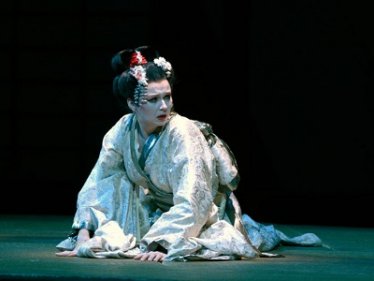Madama Butterfly - Schedule, Program & Tickets
Madama Butterfly
Tragedia giapponese in three acts
Libretto by Luigi Illica and Giuseppe Giacosa
based on David Belasco's Madame Butterfly
First performance on February 17, 1904 in Milan
Premiered at the Deutsche Oper Berlin on June 20, 1987
recommended from 12 years
2 hours 45 minutes / One break
In Italian with German and English surtitles
Introduction: 45 minutes before the start of the performance in the foyer on the right
The American Lieutenant Pinkerton has anchored his ship in the port of Nagasaki. To pass the time, he has courted the only 15-year-old geisha Cio-Cio-San, called Butterfly, who comes from a noble but impoverished family and takes her love very seriously. Pinkerton wants to enter into a “temporary marriage” with her – not unusual at the time between European men and geishas – and even looks for a small house for their honeymoon with the help of the matchmaker Goro. When the American Consul Sharpless warns him about this marriage, he makes fun of his friend and even toasts the day when he will celebrate his "real" marriage to an American woman. For the young Japanese woman, who even converted to her lover's faith out of love, the connection with the foreigner has painful consequences: she is rejected by her family after the marriage ceremony has taken place. Pinkerton struggles to comfort his "butterfly."
Three years have passed. Cio-Cio-San leads a life of seclusion with her faithful servant Suzuki and her young child. She rejects all attempts by Lord Yamadori to ask her for her hand, as she unwaveringly believes in Pinkerton's return. When Sharpless finally arrives with a message from Pinkerton asking him to prepare her for his upcoming return to Nagasaki and his marriage to American Kate, he is shocked to discover that she has a child. He doesn't dare to carry out his assignment and only tells her of Pinkerton's arrival. Cio Cio San is happy. Together with Suzuki she decorates her house, puts on her wedding dress and awaits her lover.
When Pinkerton is at the door with his wife Kate and the consul, Suzuki learns the whole truth. She should persuade Butterfly to give up her child. Pinkerton doesn't want to face her personally and runs off. Butterfly sees the strange woman and suddenly realizes: Pinkerton has not come to return to her, but to take the child with him. She asks for a half hour respite and says goodbye to her little son. Then she ends her life.
“There are opposites in theatre: arouse interest, surprise and touch. What have I to do with heroes and immortal figures? I don't like being in that kind of environment. I'm not the musician of the big things, I feel the small things, and that's the only thing I love to handle. That's how I liked Manon, because she was a girl from the heart and nothing more... And that's how I liked Butterfly, because she's such a clear, feminine thing, but who knows how to love to death.” Puccini has known MADAMA BUTTERFLY all her life as describes his favorite and also his best work. In fact, it corresponds to his self-chosen maxim of the "music of small things" almost masterfully. Finely chiseled musical details, an enchanting melody in the voice leading, unobtrusively inserted exotic elements and a sensitive mixture of the tonal colors in the orchestra have not only made the work immortal for the audience, but also made it immortal for many composers of the following generations - as well as the other operas of Puccini - by the way. to become a role model. However, public success only came after some changes by the composer. In the revised form, the opera was then performed for the first time on May 28, 1904 in Brescia. It had now been extended from the original two to three acts; the interlude between the second and third acts with the famous "humming chorus" was also added. The Deutsche Oper Berlin's production focuses on the tragedy of the young woman who remains true to her love, even if it seems hopeless for everyone else. The magic of this work unfolds particularly impressively in the atmospheric, never folkloric-looking stage set.
Subject to change.
Libretto by Luigi Illica and Giuseppe Giacosa
based on David Belasco's Madame Butterfly
First performance on February 17, 1904 in Milan
Premiered at the Deutsche Oper Berlin on June 20, 1987
recommended from 12 years
2 hours 45 minutes / One break
In Italian with German and English surtitles
Introduction: 45 minutes before the start of the performance in the foyer on the right
The American Lieutenant Pinkerton has anchored his ship in the port of Nagasaki. To pass the time, he has courted the only 15-year-old geisha Cio-Cio-San, called Butterfly, who comes from a noble but impoverished family and takes her love very seriously. Pinkerton wants to enter into a “temporary marriage” with her – not unusual at the time between European men and geishas – and even looks for a small house for their honeymoon with the help of the matchmaker Goro. When the American Consul Sharpless warns him about this marriage, he makes fun of his friend and even toasts the day when he will celebrate his "real" marriage to an American woman. For the young Japanese woman, who even converted to her lover's faith out of love, the connection with the foreigner has painful consequences: she is rejected by her family after the marriage ceremony has taken place. Pinkerton struggles to comfort his "butterfly."
Three years have passed. Cio-Cio-San leads a life of seclusion with her faithful servant Suzuki and her young child. She rejects all attempts by Lord Yamadori to ask her for her hand, as she unwaveringly believes in Pinkerton's return. When Sharpless finally arrives with a message from Pinkerton asking him to prepare her for his upcoming return to Nagasaki and his marriage to American Kate, he is shocked to discover that she has a child. He doesn't dare to carry out his assignment and only tells her of Pinkerton's arrival. Cio Cio San is happy. Together with Suzuki she decorates her house, puts on her wedding dress and awaits her lover.
When Pinkerton is at the door with his wife Kate and the consul, Suzuki learns the whole truth. She should persuade Butterfly to give up her child. Pinkerton doesn't want to face her personally and runs off. Butterfly sees the strange woman and suddenly realizes: Pinkerton has not come to return to her, but to take the child with him. She asks for a half hour respite and says goodbye to her little son. Then she ends her life.
“There are opposites in theatre: arouse interest, surprise and touch. What have I to do with heroes and immortal figures? I don't like being in that kind of environment. I'm not the musician of the big things, I feel the small things, and that's the only thing I love to handle. That's how I liked Manon, because she was a girl from the heart and nothing more... And that's how I liked Butterfly, because she's such a clear, feminine thing, but who knows how to love to death.” Puccini has known MADAMA BUTTERFLY all her life as describes his favorite and also his best work. In fact, it corresponds to his self-chosen maxim of the "music of small things" almost masterfully. Finely chiseled musical details, an enchanting melody in the voice leading, unobtrusively inserted exotic elements and a sensitive mixture of the tonal colors in the orchestra have not only made the work immortal for the audience, but also made it immortal for many composers of the following generations - as well as the other operas of Puccini - by the way. to become a role model. However, public success only came after some changes by the composer. In the revised form, the opera was then performed for the first time on May 28, 1904 in Brescia. It had now been extended from the original two to three acts; the interlude between the second and third acts with the famous "humming chorus" was also added. The Deutsche Oper Berlin's production focuses on the tragedy of the young woman who remains true to her love, even if it seems hopeless for everyone else. The magic of this work unfolds particularly impressively in the atmospheric, never folkloric-looking stage set.
Subject to change.
20
Th 19:30
Madama Butterfly
Giacomo Puccini
Giacomo Puccini
- Not available -






